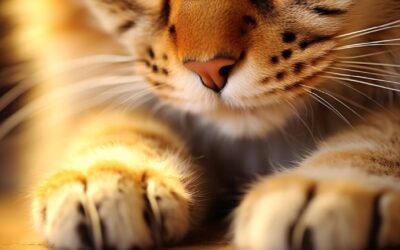We often wonder what our furry companions can and cannot eat. Chia seeds have gained popularity among health-conscious humans for their nutritional benefits, but can cats have chia seeds, too?
The short answer is yes. Chia seeds are safe for cats. Let’s explore their benefits and whether felines enjoy their taste.
What Are Chia Seeds
Chia seeds have a long history of use, dating back to ancient civilizations, the Aztecs and Mayans, who valued them for their nutritional properties and sustainable energy.
These tiny seeds are typically gray or black but can also be found in white varieties. Their mild, nutty flavor makes them a versatile addition to sweet and savory dishes.
One of the intriguing qualities of chia seeds is their ability to absorb their weight in liquid many times, creating a gel-like texture. This characteristic makes them useful for thickening smoothies, creating chia puddings, or substituting eggs in vegan baking recipes.
Chia seeds have gained popularity as a superfood due to their rich nutrient profile. However, it’s vital to incorporate them wisely, considering their unique properties and an individual’s overall dietary needs.
Are Chia Seeds Safe for Cats?
Yes, chia seeds are generally safe for cats. When consumed in moderation, chia seeds are not toxic to felines. However, it’s essential to remember that cats have specific dietary requirements that differ from humans, and chia seeds should be considered an occasional treat rather than a staple in their diet.
What Are the Benefits of Chia Seeds?
Chia seeds offer several potential benefits when incorporated into a human diet. These benefits include:
- Digestive health: Chia seeds’ high fiber content can aid digestion by promoting regular bowel movements and preventing constipation.
- Heart health: Omega-3 fatty acids found in chia seeds may help lower the risk of heart disease by reducing inflammation, lowering cholesterol levels, and regulating blood pressure.
- Weight management: Seeds can help with weight management because they absorb liquid and expand in the stomach, promoting a feeling of fullness and reducing overall calorie intake.
- Blood sugar control: Chia seeds’ soluble fiber may help stabilize blood sugar levels, making them beneficial for individuals with diabetes or those looking to manage blood sugar fluctuations.
- Bone health: Chia seeds contain essential minerals like calcium, magnesium, and phosphorus, which are vital to maintaining strong and healthy bones.
Additionally, Chia seeds contain antioxidants, which can help protect cells from damage caused by free radicals, potentially reducing the risk of chronic diseases.
What Do Chia Seeds Contain?
Chia seeds contain several vitamins and minerals, including:
- Vitamin A
- Vitamin B (various B vitamins)
- Vitamin C
- Folate
- Potassium
- Iron
- Magnesium
- Manganese
- Selenium
- Zinc
- Niacin
- Calcium
- Manganese
These nutrients improve bone health, regulate metabolism, and prevent oxidative damage. Additionally, chia seeds have a good balance of essential amino acids, making their protein high-quality and complete.
When consumed in moderation, these vitamins and minerals make chia seeds a nutrient-dense addition to a balanced diet.

Do Cats Like the Taste of Chia Seeds?
Cats may show varying interest in chia seeds, but they generally do not strongly prefer them. They are obligate carnivores, meaning their diet primarily consists of meat, and they have specific dietary requirements that animal-based proteins fulfill. Chia seeds, being plant-based, do not naturally appeal to their taste preferences or nutritional needs.
While chia seeds are not harmful to cats and can be consumed in small amounts, they do not provide any necessary benefits that cats cannot obtain from their regular diet.
Additionally, the texture and flavor of chia seeds might not be particularly appealing to many cats. If a cat owner chooses to offer chia seeds, it should be done sparingly and not as a significant part of their diet.
It’s always a good idea to consult with a veterinarian before introducing new foods into a cat’s diet to ensure they are safe and appropriate for the animal’s health needs. Consider looking into cat insurance for peace of mind regarding potential health issues.
While they may not be your cat’s favorite snack, the potential health benefits make them worth considering as a supplement to their regular meals. Always prioritize your cat’s well-being and consult with a professional for personalized dietary advice.

FAQs
How should I introduce chia seeds into my cat’s diet?
When introducing chia seeds to your cat’s diet, start with a very small amount—about a pinch sprinkled over their regular food. Monitor your cat for adverse reactions, such as gastrointestinal upset or allergies. If there are no negative effects, you can gradually increase the amount, but always keep it minimal, as chia seeds are not a necessary part of a cat’s diet.
Can chia seeds help with hairball control in cats?
While chia seeds are high in fiber, which can help with human digestion, their efficacy in controlling cat hairballs has not been scientifically proven. It’s better to rely on specially formulated cat foods or supplements designed to address this issue for hairball management.
Are there any risks associated with feeding chia seeds to cats?
Chia seeds are generally safe for cats if given in small amounts. However, excessive consumption could lead to digestive issues such as diarrhea or constipation due to their high fiber content. Always ensure your cat has access to plenty of water, especially if you include chia seeds in their diet.
Can kittens eat chia seeds, or is it better to wait until they are older?
It’s advisable to wait until a kitten is mature and has a fully developed digestive system before introducing non-traditional foods, including chia seeds. Kittens require a diet tailored to their growth needs, primarily focusing on high-quality animal proteins.
If you are considering adding a new furry member to your family, check out our listings for kittens for sale.
What are some ways to provide the nutritional benefits of chia seeds?
If you’re looking to provide the benefits associated with the omega-3 fatty acids and fiber in chia seeds, consider cat-specific supplements that contain these nutrients in forms more suitable for cats.
Fish oil supplements, for instance, are a good source of omega-3 fatty acids specifically designed for feline health and are often more palatable to cats than chia seeds.
References:
- Common Cat Hazards: This resource explores common risks to cats in the home environment and offers practical advice on how to keep your pet safe.
- Managing Feline Idiopathic Hypercalcemia With Chia Seeds: This article discusses a study that explores the potential benefits of chia seeds for cats with specific health conditions.
- EATING YOUR GREENS: THE BASICS OF CAT GRASS: Discover why cat grass can be a beneficial addition to your cat’s diet, including its digestive health benefits.
- Seeking Advice on How to Feed an Emaciated Cat: Find expert recommendations and nutritional guidelines to help rehabilitate undernourished cats.






0 Comments